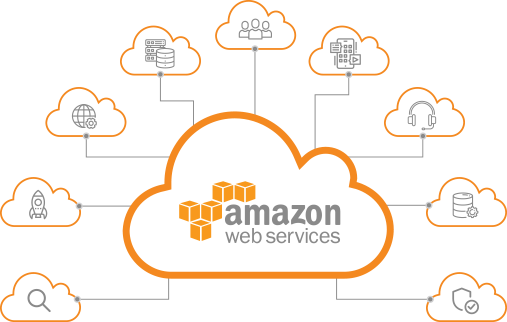What is AWS?
The cloud has become an integral part of modern businesses, and AWS leads the industry with its comprehensive, on-demand cloud computing platform. Services range from storage and networking to computing, databases, analytics, application services, and more.
Notably, AWS provides an intuitive user interface that simplifies complex operations such as creating an account or selecting the right service for your use case. You can rest assured that enterprise-level applications can be securely hosted in the cloud via AWS and managed with ease.
AWS users need to follow security best practices, such as encrypting their data before sending it to Amazon servers, using multi-factor authentication, and familiarizing themselves with the Amazon Security Best Practices guide. AWS also offers a free trial period so you can test the platform before committing resources in the long term.

Use The Right Security Practices With AWS
Using the right security practices with AWS Cloud Computing Services is essential for any business leveraging cloud computing solutions. AWS offers a wide range of cloud services and security measures, making it one of the most secure and reliable cloud providers available. To ensure that your resources are adequately protected, there are several steps you must take to leverage all the features AWS has to offer.
Finally, use IAM roles where possible instead of individual user accounts, as this way you can easily revoke access rights when necessary without having to delete user accounts altogether. Likewise, use network segmentation policies so that only specific services are exposed externally, allowing ports specifically related to those services to remain open while keeping all other ports closed off from public view. This significantly reduces the attack surface available to malicious actors. At Kelly Technologies, we are proud to offer the only AWS Training that covers each and every facet of Amazon Web Services.
By taking these steps, businesses will have better protection against malicious actors attempting to gain access to sensitive data stored within their environments, helping build stronger trust relationships with customers and vendors alike.
Security Best Practices for AWS Cloud Computing Services
As businesses increasingly operate in the cloud, leveraging advanced AWS Cloud Computing Services becomes more important to ensure data security and protection. Understanding the core security features and implementing best practices is vital for long-term data security. In this section, we will discuss key security practices for using AWS cloud computing services.
To start, take advantage of different levels of authentication and access control to ensure that only authorized users can access sensitive information. Cloud firewalls and encryption technologies provide an additional layer of protection against potential threats. Follow industry best practices to securely deploy container services and microservices to protect from unauthorized access attempts.
Monitor threats and system activity with logs and analytics tools such as Amazon CloudWatch logs or Splunk/SumoLogic to detect suspicious behavior or activity in real time. Regularly backup systems but be mindful of storage limits.
For secure access to cloud services through identity and access management (IAM), implement strong authentication protocols such as two-factor authentication (2FA). Enforce secure connections with encryption technologies such as SSL/TLS certificates.
Creating a Reliable and Scalable Infrastructure with AWS Cloud Computing
For businesses seeking a reliable and scalable infrastructure, AWS Cloud Computing Services is the way to go. With tools such as Amazon EC2, Amazon S3, and Amazon RDS, you can easily build secure and cost-effective applications that are highly available. This article discusses how to leverage AWS Cloud Computing Services to create an automated and reliable infrastructure. Kelly Technologies, an industry leader in professional IT training and certifications.
Networking features also play an important role in building a reliable cloud infrastructure using AWS Cloud Computing Services. By leveraging virtual private clouds (VPCs), organizations can securely connect their existing IT infrastructure with their new cloud environment while also benefiting from increased visibility into resources being used in the cloud through monitoring tools such as CloudWatch or ElasticSearch metrics, which provide alerting notifications when needed most.
Security-wise, it’s possible to further improve protection on top of what’s already provided by default on AWS platforms through Identity & Access Management (IAM). This allows organizations control over who has access to what within their environment, ensuring compliance is always maintained regardless of where users are located or what devices they use. Lastly, there are managed services offered by AWS that simplify operational efficiency, allowing companies to focus on development rather than managing complex infrastructures or applications themselves.
Adapting Your Business IT Infrastructure for Cloud Computing Success
Adapting your business IT infrastructure for cloud computing success begins with understanding the benefits of leveraging AWS Cloud Computing Services. Cloud computing offers businesses a wide range of advantages, such as scalability, cost-efficiency, and agility. It also enables organizations to quickly develop and deploy applications and services across multiple platforms.
To get the most out of cloud computing services, it is important to understand the different types of solutions available on the market, from Infrastructure as a Service (IaaS) to Platform as a Service (PaaS). You can choose from various options depending on your specific needs. Once you have identified the type of solution that best suits your requirements, it is time to implement this technology in your infrastructure.
When migrating to the cloud, it is important to consider the right approach that will ensure success for your organization. You should identify workloads that can benefit from cloud computing and create a plan outlining how they will transition into the cloud environment. Additionally, you must select appropriate cloud services for your business needs and implement secure yet compliant infrastructural services that meet industry standards.
To Conclude
This article in Tech Ruled has given you such informative content. AWS cloud computing services are a great option for businesses of all sizes looking to leverage the power of the cloud. By understanding the services that best suit your project needs and implementing adequate security measures, organizations can benefit from AWS’ scalability and cost-efficiency. Furthermore, optimizing operations while maintaining reliable service levels requires monitoring performance metrics and staying up to date with the latest developments and resources.



